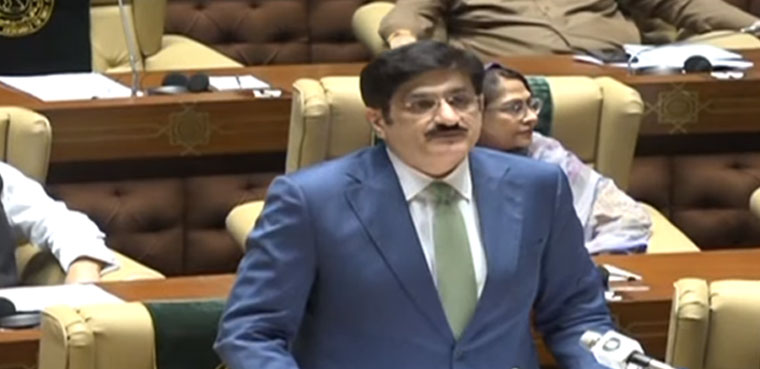KARACHI: Sindh Chief Minister Syed Murad Ali Shah, who also holds the portfolio of Finance Minister, on Friday presented a Rs3.056 trillion budget for the next fiscal year 2024-25, proposing a massive hike of 22 to 30 pc in salaries and a significantly higher development expense of Rs959 billion.
Addressing the budget session of the Sindh Assembly, CM Murad Ali Shah said that the total outlay of the budget for the province is estimated at Rs3.056 trillion.
Presenting the budget 2024-25, the chief minister announced a salary hike of 30pc for the Sindh government employees between grades 1 and 16 and 22pc for the employees between grades 17 and 22.
Murad Ali Shah also proposed a 15% increase in pensions and the minimum wage from Rs35,550 to Rs37,000.
The chief minister said that the government has set aside Rs519 billion for education and Rs334 bn for health sector in the budget 2024-25.
Likewise, the provincial government has allocated 56 billion for the transport sector in budget 2024-25 and Rs302 billion for the local government.
Major points and announcements
Benazir Haari Card
Benazir Mazdoor Card
Free solar panels to 2.6m households
Construction of new canals
Rs20bn Ramadan package
Scholarship to meritorious students
Major allocations
Rs519bn allocated for Education
Rs334bn allocated for Health
Rs94bn for Agriculture
Rs86 bn allocated for Works and Services
Rs30bn for Planning and Development
Rs56billion for transport
Rs163billion for police and law enforcement agencies
Rs6.4bn allocated for differently-abled persons
Rs28.4bn allocated for SSWB
Rs10bn allocated for clean water
Rs45m allocated for KCR
Rs500m for Benazir Women Agriculture Workers Assistance
Sindh Budget 2024-25
According to the documents available with ARY News, the ‘balanced’ budget mainly centres around the rehabilitation of flood-affected people and social protection for the poor.
The total projected revenue for the province is worth R3 trillion. The majority of the total projected revenue for the province comes from the 62% federal transfers, followed by 22% provincial receipts.
The remaining receipts are through current capital receipts of Rs22bn, foreign project assistance of Rs334bn, other federal grants in the form of PSDP of Rs77bn, foreign grants of Rs6bn, and a carryover cash balance of Rs55bn.
Provincial Receipts of Rs662bn comprise Sales Tax on Services of Rs350bn, Tax excluding GST of Rs269bn, and provincial non-tax receipts of Rs42.9 bn.
These funds are strategically allocated: 63 pc or Rs1.9 trillion goes towards Current Revenue, 6pc or Rs184bn for Current Capital, and the remaining 31pc or Rs959bn is dedicated to Development Expenditure.
Department Allocation
The Sindh budget 2024-25 prioritises investment in social services. Education receives the largest allocation at Rs519 billion, with Rs459 billion dedicated to current revenue expenditure.
Healthcare follows closely with a total allocation of Rs334 billion, with Rs302 billion earmarked for current expenses. Local government rounds out the top three with a proposed budget of Rs329 billion.
The budget also allocates significant resources to key infrastructure sectors: Rs58 billion for agriculture (including Rs32 billion for current expenditure), Rs77 billion for energy (with Rs62 billion for ongoing costs), Rs94 billion for irrigation (with Rs36 billion for current expenses), Rs86 billion for Works & Services, and Rs30 billion for Planning & Development.
The remaining major departments include Transport (Rs56 billion), Works & Services (Rs86 billion), SG&CD (Rs153 billion), and Home (Rs194 billion).
Relief Measures
The Sindh Budget 2024-25 prioritises social and economic well-being, particularly in the wake of recent floods.
This comprehensive approach incorporates several key relief measures:
Increased Compensation: Salary increases of 22-30pc and pension hikes of 15pc aim to bolster financial security.
Minimum Wage: Additionally, a minimum wage increases to Rs37,000 has been proposed.
Social Investment: A significant allocation of Rs34.9 billion targets pro-poor initiatives, directly assisting vulnerable populations.
Subsidy Programmes: The budget includes Rs116 billion in subsidies to ease the financial burden on citizens.
Housing Focus: A dedicated Rs25 billion will be directed towards housing schemes, promoting access to safe and secure shelter.
New Initiatives
The Sindh budget 2024-25 extends its focus beyond immediate relief measures. Several new initiatives target the long-term development of the province’s economy and social well-being
Hari Card: A Rs8 billion allocation will provide financial support to 12 million farmers, bolstering the agricultural backbone of Sindh.
Inclusive Enclave: Rs5 billion allocations to build a Complex to offer education, rehabilitation, training, accommodation, clinical services, recreation and other facilities within a compound at Korangi along the Malir Expressway.
Fiscal Decentralisation in Police: For the first time, 485 police station-specific budget has been allocated to enable them to meet their fuel, repair & maintenance, and day-to-day expenditures to serve communities.
Solarisation Initiative: A Rs5 billion allocation over five years will be directed towards distributing solar home systems, and promoting clean energy access.
Hub Canal Project: A dedicated Rs5 billion will fund the construction of a new canal to provide water to Karachi.
Mazdoor Card: A Rs5 billion welfare programme will provide support for labourers in Sindh.
Pro-Poor Initiatives: To ensure social upward mobility, the Budget allocates Rs11 billion to agriculture, Rs12 billion for social protection, Rs3.2 billion for Universities & Board, Rs2 billion for Housing & Town Planning, and Rs1.5 billion for DEPD.
Grants in Aid
The Sindh provincial budget prioritises investment in human capital through significant grants for education and healthcare.
Major grants amount to a total of Rs190 billion, with Rs35 billion specifically earmarked for universities across Sindh.
These grants will also support major hospitals and medical institutes like SIUT, NICVD, Indus Hospital, SICHN, and Trauma Centers.


Leave a Comment